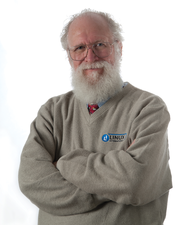Linux and the consumer advocate
Watchdog

"maddog" remembers meeting Ralph Nader and explaining the concept of open source software.
The year was 1998, and only four years after I had met Linus and become involved with Linux. It was the spring (May 18th to be exact), but still so cold that Ocean City, Maryland, was welcoming small conferences before the "summer crowd" shuffled in.
The conference that I attended that cold spring was Uniforum, which presented the business side of Unix systems. By this time, Linux (we had not started calling it "GNU/Linux" at that point) had been given a track of its own on the last day of the three-day conference, and I was the program chair for that track.
One of the main speakers that conference was Ralph Nader. For those of you who are perhaps too young or are not part of American politics, Nader is a tort lawyer, most famous for a book written in the mid-1960s called Unsafe At Any Speed about how manufacturers will often ignore safety issues to get products out to market at a lower cost or faster. A tort is a "wrongful act that hurts people" and includes cars, toys, dangerous chemicals, and even monopolistic acts, which is one of the reasons that Nader was at Uniforum, talking about how software monopolies hurt the software industry.
[...]
Buy this article as PDF
(incl. VAT)
Buy Linux Magazine
Subscribe to our Linux Newsletters
Find Linux and Open Source Jobs
Subscribe to our ADMIN Newsletters
Support Our Work
Linux Magazine content is made possible with support from readers like you. Please consider contributing when you’ve found an article to be beneficial.

News
-
Introducing matrixOS, an Immutable Gentoo-Based Linux Distro
It was only a matter of time before a developer decided one of the most challenging Linux distributions needed to be immutable.
-
Chaos Comes to KDE in KaOS
KaOS devs are making a major change to the distribution, and it all comes down to one system.
-
New Linux Botnet Discovered
The SSHStalker botnet uses IRC C2 to control systems via legacy Linux kernel exploits.
-
The Next Linux Kernel Turns 7.0
Linus Torvalds has announced that after Linux kernel 6.19, we'll finally reach the 7.0 iteration stage.
-
Linux From Scratch Drops SysVinit Support
LFS will no longer support SysVinit.
-
LibreOffice 26.2 Now Available
With new features, improvements, and bug fixes, LibreOffice 26.2 delivers a modern, polished office suite without compromise.
-
Linux Kernel Project Releases Project Continuity Document
What happens to Linux when there's no Linus? It's a question many of us have asked over the years, and it seems it's also on the minds of the Linux kernel project.
-
Mecha Systems Introduces Linux Handheld
Mecha Systems has revealed its Mecha Comet, a new handheld computer powered by – you guessed it – Linux.
-
MX Linux 25.1 Features Dual Init System ISO
The latest release of MX Linux caters to lovers of two different init systems and even offers instructions on how to transition.
-
Photoshop on Linux?
A developer has patched Wine so that it'll run specific versions of Photoshop that depend on Adobe Creative Cloud.
